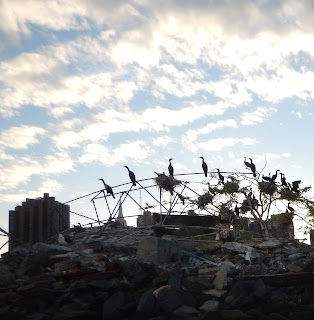 |
| By Harry Clarke |
The establishment of an empire that spans planets and planes with networks of sorcery, trade, sex, and death was always fated to distill its own tincture of travesty and wonder into the multiverse. When the Hyperboreans reached past the stars and looked on the intricate chaos of creation with eyes of lordship and lust, the existence of victims was a foregone conclusion. Some species were annihilated as potential rivals, others found their worlds drained to power engines of fate. And some were dispossessed of home and form merely as a passing entertainment for some sorcerer-god on their way to greener stars.
It is likely that even the Reflected Glories do not remember their original shape. They were divested of body and sanity at the same time and tossed into the astral winds. But even in madness they remembered those who wreaked their weird and sought them through the infinite images of reality. They became light trapped in matter, refracted from sky to sky, until finally they shined through the right crack and felt a familiar taint to the angle of their incidence. They had found Hyperborea.
And though the Hyperboreans were laid low by decadence and disease, a sacttered tribe of isolated wanderers, embittered by memories of glory, hatred of the Hyperboreans was all that kept the remnants of their nameless victims from shattering on the cosmic winds. And so they found ways to enter the bodies of humans. And once there they took their revenge.
Reflected Glories are parasites made of light and hatred. Neither individual nor species, the infestations enter their hosts from reflections in cursed mirrors, corrupted pools, stolen silver, glass viewed from the wrong side of the night. They choose hosts with influence and standing, local powers, retired adventurers, those with fortune enough to lure in the desperate Hyperboreans with schemes of glory and power. They often work to hire parties of fortune hunters only to send them into hopeless situations or after items that will bring about their doom. They try especially to engineer situations that will cause the party to turn on its Hyperborean members and sacrifice them for the survival of the group.
Each Hyperborean brought to their doom by one of the Reflected Glories increases the power of that infection. As its power increases, so do its recklessness, its drive, and its monomaniacal obsession with ruining the remnants of the Hyperborean sorcerer-rulers. Some infections focus on eliminating all remnants of one of the Twelve Clans. Others seek out the most powerful fortune hunters. And as the power of the Reflected Glory increases, it becomes less and less stable, its photonic manifestation incandescing from song to scream.
Reflected Glory
No. Encountered
|
1
|
Alignment
|
Chaotic
|
Size
|
M
|
Movement
|
40 [normal human]
|
Dexterity
|
7
|
Armour Class
|
9 (unarmored)
|
Hit Dice
|
2-8
|
Attack Rate
|
1/1 (by weapon)
|
Damage
|
(by weapon)
|
Saving Throw
|
13-16 (+2 vs. Sorcery, Transformation)
|
Morale
|
7-12
|
Experience Points
|
2HD: 72, 3HD: 113, 4HD: 210, 5HD: 350, 6 HD: 620, 7HD: 930, 8HD: 1240
|
Treasure Class
|
S, T, W, X (note: this treasure is generally in a well-to-do household with large, valuable, and notable items)
|
A host human inhabited by a Reflected Glory infestation shows signs that some other force is at play. The hold of vengeance-lusting interplanar light parasites on the coherence of flesh is dubious and becomes more so as the parasite feeds on Hyperborean dooms. Buboes, excrescences, pendular sacs, and questing worms or slow avalanches of flesh are possible side effects of the loosening hold of the parasite on its guise. Eventually they forget human ways of dressing and toilet and begin to simply form more or less convincing clothes out of folds of flesh.
Though they tend to select hosts of beauty, wit, and charm, as well as wealth, the movements of the hosts are jerky and strangely timed, as if viewed through rapidly shifting light.
The sight of the host’s reflection loosens the parasite’s grasp on its appearance, yet they are fascinated by mirrors and seem to derive sustenance from gazing upon their image. The opulent homes of a host are often lavishly filled with mirrors, kept covered whenever guests or staff are around.
A host will have social standing, allies, guards, a defensible home, and all the power of the wealthy.
Special:
- Immune to normal weapons, magical piercing weapons, fire, electricity, cold, acid, poison, charm, sleep, mind-affecting spells
- Reflects electrical attacks and spells back on source
- One point of damage from magical slashing weapons
- Double damage from magic blunt weapons, crushing blows, and falls
- Reflection Gaze: Gaze can cause target’s bones to turn to mirror glass; save against sorcery or 1d8 damage, plus 1d6 damage whenever attacking or any other strenuous physical action until glass is removed (1d8 damage)
Bonus Tracks
 |
| Elf testicles? |
I Attack Them Using My ... Additional Notes
- Details of the project at Cavegirl's blog.
- Too many words? Check out the subtitle
- Also check out that table! Yeeeeah! (Does it work on mobile?)
- This torrid pace will not be maintained.






